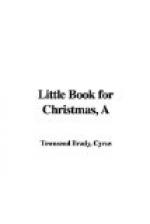Nor is Christmas a time for gluttonous eating and drinking. To gorge one’s self with quantities of rich and indigestible food is not the noblest method of commemorating the day. The rules and laws of digestion are not abrogated upon the Holy day. These are material cautions, the day has a spiritual significance of which material manifestations are, or ought to be, outward and visible expressions only.
Christmas is one of the great days of obligation in the Church year, then as at Easter if at no other time, Christians should gather around the table of the Lord, kneeling before God’s altar in the ministering of that Holy Communion which unites them with the past, the present, and the future—the communion of the saints of God’s Holy Church with His Beloved Son. Then and thus in body, soul, and spirit we do truly participate in the privilege and blessing of the Incarnation, then and there we receive that strength which enables everyone of us to become factors in the great extension of that marvellous occurrence throughout the ages and throughout the world.
Let us therefore on this Holy Natal Day, from which the whole world dates its time, begin on our knees before that altar which is at once manger, cross, throne. Let us join thereafter in holy cheer of praise and prayer and exhortation and Christmas carol, and then let us go forth with a Christmas spirit in our hearts resolved to communicate it to the children of men, and not merely for the day but for the future. To make the right use of these our privileges, this it is to save the world.
In this spirit, therefore, so far as poor, fallible human nature permits him to realize it and exhibit it, the author wishes all his readers which at present comprise his only flock—
A MERRY CHRISTMAS AND A HAPPY NEW YEAR.
[Illustration]
IT WAS THE SAME CHRISTMAS MORNING
[Illustration]
[Illustration]
In Which it is Shown how Different the Same Things may Be
A Story for Girls
In Philadelphia the rich and the poor live cheek by jowl—or rather, back to back. Between the streets of the rich and parallel to them, run the alleys of the poor. The rich man’s garage jostles elbows with the poor man’s dwelling.
In a big house fronting on one of the most fashionable streets lived a little girl named Ethel. Other people lived in the big house also, a father, a mother, a butler, a French maid, and a host of other servants. Back of the big house was the garage. Facing the garage on the other side of the alley was a little, old one-story-and-a-half brick house. In this house dwelt a little girl named Maggie. With her lived her father who was a labourer; her mother, who took in washing; and half a dozen brothers, four of whom worked at something or other, while the two littlest went to school.




